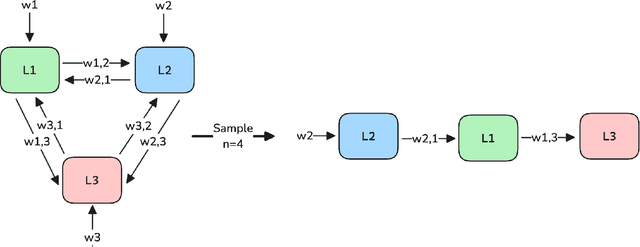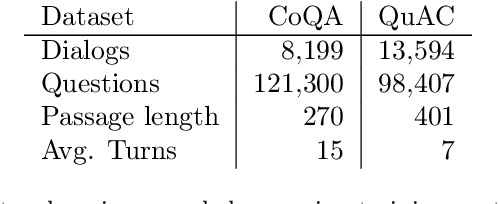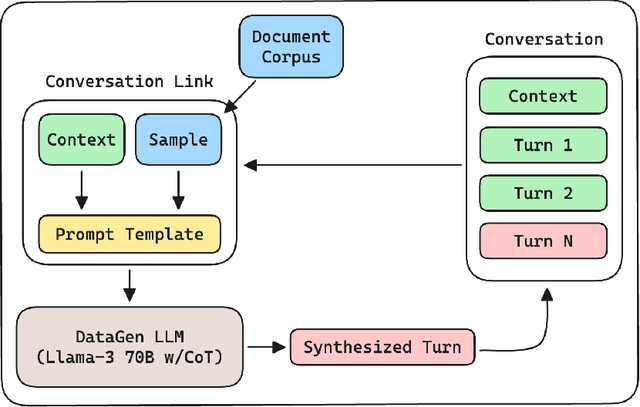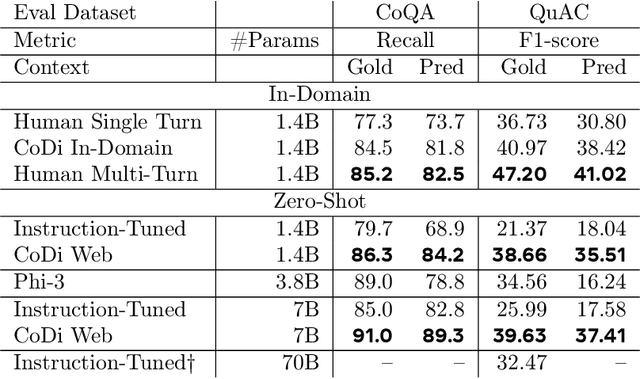Rylan Conway
CoDi: Conversational Distillation for Grounded Question Answering
Aug 20, 2024



Abstract:Distilling conversational skills into Small Language Models (SLMs) with approximately 1 billion parameters presents significant challenges. Firstly, SLMs have limited capacity in their model parameters to learn extensive knowledge compared to larger models. Secondly, high-quality conversational datasets are often scarce, small, and domain-specific. Addressing these challenges, we introduce a novel data distillation framework named CoDi (short for Conversational Distillation, pronounced "Cody"), allowing us to synthesize large-scale, assistant-style datasets in a steerable and diverse manner. Specifically, while our framework is task agnostic at its core, we explore and evaluate the potential of CoDi on the task of conversational grounded reasoning for question answering. This is a typical on-device scenario for specialist SLMs, allowing for open-domain model responses, without requiring the model to "memorize" world knowledge in its limited weights. Our evaluations show that SLMs trained with CoDi-synthesized data achieve performance comparable to models trained on human-annotated data in standard metrics. Additionally, when using our framework to generate larger datasets from web data, our models surpass larger, instruction-tuned models in zero-shot conversational grounded reasoning tasks.
PrE-Text: Training Language Models on Private Federated Data in the Age of LLMs
Jun 05, 2024Abstract:On-device training is currently the most common approach for training machine learning (ML) models on private, distributed user data. Despite this, on-device training has several drawbacks: (1) most user devices are too small to train large models on-device, (2) on-device training is communication- and computation-intensive, and (3) on-device training can be difficult to debug and deploy. To address these problems, we propose Private Evolution-Text (PrE-Text), a method for generating differentially private (DP) synthetic textual data. First, we show that across multiple datasets, training small models (models that fit on user devices) with PrE-Text synthetic data outperforms small models trained on-device under practical privacy regimes ($\epsilon=1.29$, $\epsilon=7.58$). We achieve these results while using 9$\times$ fewer rounds, 6$\times$ less client computation per round, and 100$\times$ less communication per round. Second, finetuning large models on PrE-Text's DP synthetic data improves large language model (LLM) performance on private data across the same range of privacy budgets. Altogether, these results suggest that training on DP synthetic data can be a better option than training a model on-device on private distributed data. Code is available at https://github.com/houcharlie/PrE-Text.
Time Masking: Leveraging Temporal Information in Spoken Dialogue Systems
Jul 25, 2019



Abstract:In a spoken dialogue system, dialogue state tracker (DST) components track the state of the conversation by updating a distribution of values associated with each of the slots being tracked for the current user turn, using the interactions until then. Much of the previous work has relied on modeling the natural order of the conversation, using distance based offsets as an approximation of time. In this work, we hypothesize that leveraging the wall-clock temporal difference between turns is crucial for finer-grained control of dialogue scenarios. We develop a novel approach that applies a {\it time mask}, based on the wall-clock time difference, to the associated slot embeddings and empirically demonstrate that our proposed approach outperforms existing approaches that leverage distance offsets, on both an internal benchmark dataset as well as DSTC2.
 Add to Chrome
Add to Chrome Add to Firefox
Add to Firefox Add to Edge
Add to Edge